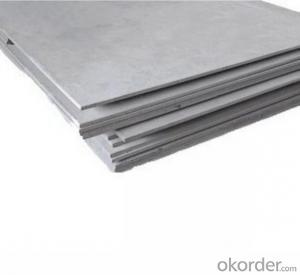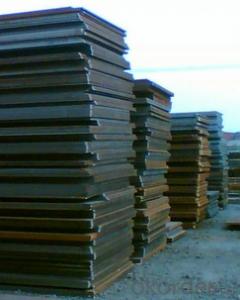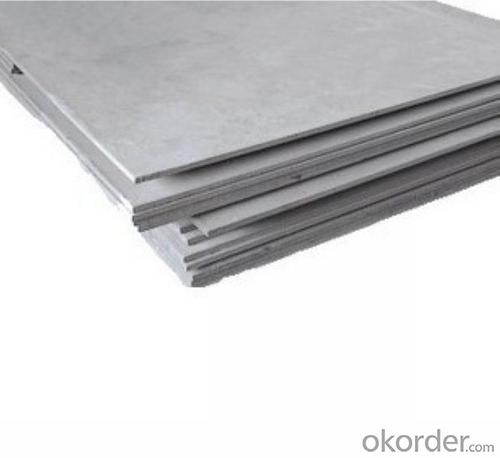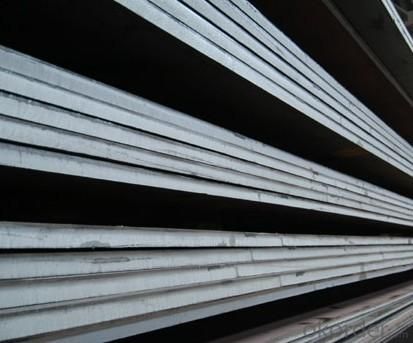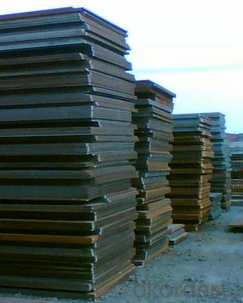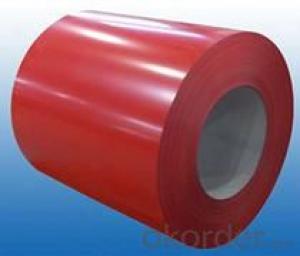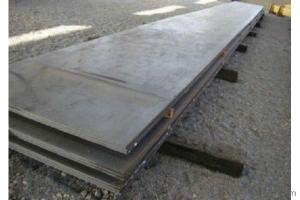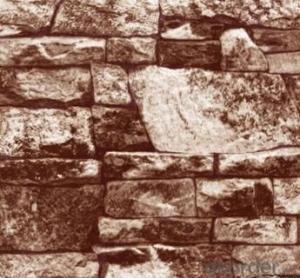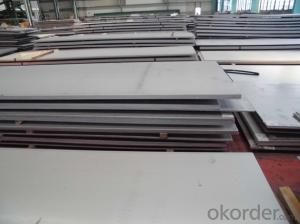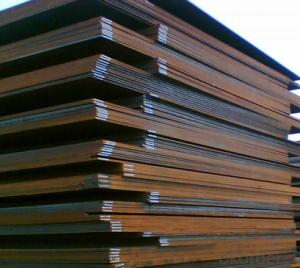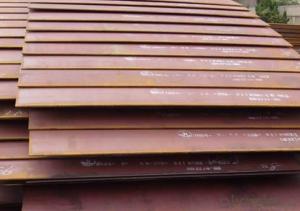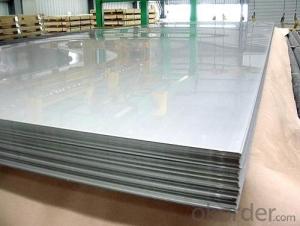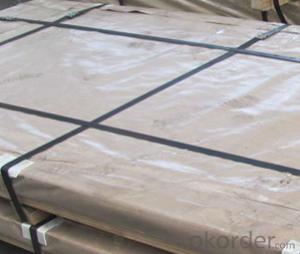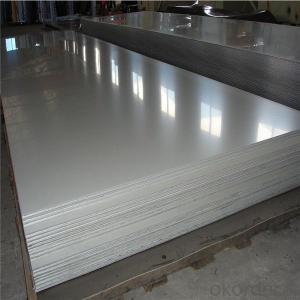Stainless Steel Plate or Sheet CR 2mm 304 CNBM
- Loading Port:
- Qingdao
- Payment Terms:
- TT OR LC
- Min Order Qty:
- 10 pc
- Supply Capability:
- 30 pc/month
OKorder Service Pledge
OKorder Financial Service
You Might Also Like
Quick Details
| Grade: | 300 Series | Standard: | ASTM, AISI, DIN, EN, JIS | Length: | 1000-6000mm |
| Thickness: | 0.2-120mm | Width: | 500-2000mm | ||
| Brand Name: | TISCO LISCO | Model Number: | 304 | Type: | Plate |
| Application: | building,decorating.... | Certification: | SGS | stardard: | ASTM,AISI,,EN,DIN,SNS |
| delivery detail: | 7-10 working days (based on the qty) | pacakage: | Standard export sea-worthy package | technique: | cold rolled and hot rolled |
Packaging & Delivery
| Packaging Details: | Standard export sea-worthy package, covered with PVC, and wooden case, or customize package for 304 stainless steel sheet |
| Delivery Detail: | nomally 7-10 working days for 304 stainless steel sheet |
Type | 304 |
Brand name | TISCO,LISCO,BAOSTEEL,ZPSS |
Thickness | 0.2mm-120mm |
Width | 500mm-2000mm |
Length | 1000mm-6000mm or customized |
Brand name | TISCO,JISCO,BAOSTEEL,POSCO,LIANZHONG,ETC |
Standard | ASTM,AISI,,EN,DIN,SNS |
Surface | 2B,CR,mirror,super mirror,BK,8K,brush,HL,NO.4,BA,NO.1,HR |
Packaging | Standard export sea-worthy package, covered with PVC, and wooden case, or customize package |
- Q: What are the benefits of using pre-painted steel sheets?
- There are several benefits to using pre-painted steel sheets in various applications. Firstly, pre-painted steel sheets offer enhanced durability and longevity compared to other materials. The paint coating on these sheets provides a protective barrier against corrosion, rust, and weathering, ensuring that the steel remains in excellent condition for an extended period of time. This makes pre-painted steel sheets ideal for outdoor use, where they are continuously exposed to harsh environmental conditions. Secondly, pre-painted steel sheets offer a wide range of color options and finishes, allowing for greater design flexibility. Whether it's for architectural purposes, interior decoration, or industrial applications, the availability of different colors and finishes enables the creation of aesthetically pleasing and visually appealing structures or products. Additionally, pre-painted steel sheets are easy to maintain and clean. The paint coating makes them resistant to stains, dirt, and grime, making them easier to keep clean and requiring less maintenance over time. This makes them an attractive choice for applications where cleanliness and hygiene are essential, such as in the food and beverage industry or healthcare facilities. Furthermore, pre-painted steel sheets are highly versatile and can be used in a wide range of industries and applications. From roofing and cladding to automotive parts, appliances, and furniture, pre-painted steel sheets provide a reliable and cost-effective solution for various purposes. They can be easily fabricated, cut, and formed into desired shapes and sizes, making them suitable for diverse manufacturing processes. Lastly, pre-painted steel sheets are environmentally friendly. The paint coatings used on these sheets are typically formulated to be low in volatile organic compounds (VOCs), reducing their impact on air quality and human health. Additionally, the durability and longevity of pre-painted steel sheets contribute to a longer lifespan, reducing the need for frequent replacements and minimizing waste. In conclusion, the benefits of using pre-painted steel sheets include enhanced durability, a wide range of design options, easy maintenance, versatility, and environmental friendliness. These advantages make pre-painted steel sheets a preferred choice for many industries and applications.
- Q: Are the steel sheets suitable for outdoor signage?
- Yes, steel sheets are generally suitable for outdoor signage due to their durability, weather resistance, and ability to withstand harsh environmental conditions.
- Q: Will the plating steel be rusty? Will it rust when touching the water?
- Plating (Electroplating) process is to use the principle of electrolysis plating on a thin layer of metal or alloy in some metal surface, is the process of making the surface of metal or other material parts attached to a layer of metal film by electrolysis so as to prevent metal oxide (rust), improve wear resistance, electrical conductivity, reflection, corrosion resistance (copper sulfate) and improves the appearance effect. The outer layers of many coins are also electroplated.
- Q: What is the process of manufacturing steel sheets?
- The process of manufacturing steel sheets involves several steps. First, iron ore is extracted from the ground and processed to remove impurities. This iron ore is then smelted in a blast furnace, along with coke and limestone, to produce molten iron. The molten iron is further refined in a basic oxygen furnace or an electric arc furnace to remove any remaining impurities and adjust the desired composition. Once the iron has been refined, it is converted into steel by adding alloying elements such as carbon, manganese, and other elements as required. The molten steel is then cast into large slabs or ingots. These slabs are reheated and passed through rolling mills to reduce their thickness and shape them into long, flat sheets. The sheets are then cooled, coated or treated as necessary, and cut into desired sizes before being packaged and shipped for various applications.
- Q: Are steel sheets suitable for solar panel mounting?
- Yes, steel sheets are suitable for solar panel mounting. They provide a strong and stable base for the panels, ensuring they are securely installed and can withstand various weather conditions. Additionally, steel sheets are durable and long-lasting, making them a reliable choice for solar panel mounting systems.
- Q: Can steel sheets be used for electrical conductivity?
- No, steel sheets are not typically used for electrical conductivity as they are not good conductors of electricity.
- Q: Are steel sheets suitable for cold storage applications?
- Yes, steel sheets are suitable for cold storage applications. Steel is known for its durability, strength, and resistance to extreme temperatures, making it an ideal material for cold storage facilities. It helps maintain a consistent temperature, prevents condensation, and provides excellent insulation, ensuring the quality and freshness of stored goods. Additionally, steel sheets are easy to clean, maintain, and can withstand heavy loads, making them a reliable choice for cold storage applications.
- Q: What's the material of ASTM A653 G30 galvanized sheet?
- Galvanized steel sheet is to prevent the corrosion of steel plate surface and prolong its service life, and the surface of steel plate is coated with a layer of metal zinc. This kind of zinc coated steel plate is called galvanized sheet.
- Q: What is the difference between a pre-annealed and full hard steel sheet?
- A pre-annealed steel sheet is a steel sheet that has undergone the annealing process. This process includes heating the steel to a specific temperature and then cooling it slowly. By doing so, internal stresses in the steel are relieved and its ductility and workability are improved. Consequently, pre-annealed steel sheets possess greater formability and are more easily shaped and manipulated compared to their non-annealed counterparts. On the flip side, a full hard steel sheet has not been subjected to the annealing process and maintains its original hardness and strength. These sheets are commonly used in applications that necessitate high strength, durability, and resistance to deformation. They are less ductile and more rigid, which makes them suitable for situations where shape retention and stiffness are crucial, such as in automotive components or structural supports. In conclusion, the primary distinction between pre-annealed and full hard steel sheets lies in their formability and strength characteristics. Pre-annealed steel sheets are more malleable and easier to shape, while full hard steel sheets offer greater strength and rigidity. The choice between the two depends on the specific requirements of the application and the desired balance between formability and strength.
- Q: Can steel sheets be used for modular construction or prefabricated buildings?
- Modular construction and prefabricated buildings can utilize steel sheets for their construction. The strength, durability, and versatility of steel make it a popular choice for this type of construction. Steel sheets can be used to build the framework, walls, and roof of prefabricated buildings. Modular construction involves fabricating building components in a controlled factory environment. Steel sheets can be easily cut, shaped, and welded to create customized building modules. These modules can then be transported to the construction site and quickly assembled. The use of steel sheets ensures precision and consistency in the manufacturing process, resulting in high-quality components. Steel's excellent strength-to-weight ratio makes it ideal for modular construction. Using steel sheets allows for lightweight yet sturdy building modules. This is advantageous for transportation and installation, as it reduces the overall weight and cost associated with shipping and lifting the modules. Furthermore, steel is a durable material that can withstand various weather conditions and environmental factors. It is resistant to fire, termites, and rot, making it a reliable choice for long-lasting prefabricated buildings. Steel sheets can also be treated to enhance their corrosion resistance, protecting the building against rust and deterioration. In addition to its strength and durability, steel offers design flexibility. Steel sheets can be easily manipulated to create different shapes and forms, allowing for diverse architectural styles and configurations. This versatility makes steel an attractive option for architects and builders looking to create aesthetically pleasing and functional prefabricated buildings. Overall, steel sheets are suitable for modular construction and prefabricated buildings due to their strength, durability, versatility, and design flexibility. Using steel in this construction method enables efficient manufacturing, easy transportation, and quick assembly, resulting in cost-effective and high-quality buildings.
Send your message to us
Stainless Steel Plate or Sheet CR 2mm 304 CNBM
- Loading Port:
- Qingdao
- Payment Terms:
- TT OR LC
- Min Order Qty:
- 10 pc
- Supply Capability:
- 30 pc/month
OKorder Service Pledge
OKorder Financial Service
Similar products
Hot products
Hot Searches
Related keywords
